Finding a home in the Catholic Church
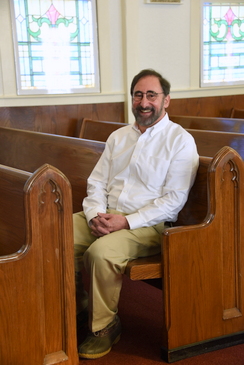
“All she did was tell me, and my immediate thought was, ‘We have to go.’ Something told me we had to go,” he says.
Medjugorje is a town in Bosnia and Herzegovina, where many believe the Blessed Mother has appeared. Although the Vatican has not authenticated the apparitions, the village has drawn millions of pilgrims since the first one was reported in 1981.
Ira, who is Jewish, says he knew the trip would be important to his wife, who is Catholic, but he felt drawn there, too. It would become a turning point in his life.
“I was touched. I could really feel the presence of Jesus and our Mother. A lot of things happened there,” he says.
Things that led Ira to the Catholic Church. He will be baptized, confirmed, and make his first Communion during the Easter Vigil.
“I came away feeling like this was what I was called to do,” he says.
Ira is one of 13 individuals participating in the Rite of Christian Initiation of Adults at St. Brendan the Navigator Parish in Camden, the largest number from the parish in years. The group includes five catechumens like Ira, who have never been baptized, and eight individuals, known as candidates, who were previously baptized in other Christian traditions. They range in age from their teens to their 70s and come from various walks of life.
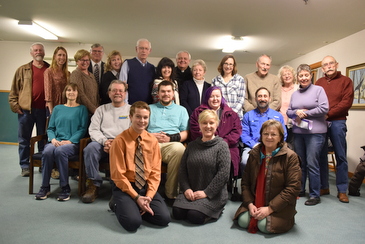
“In an area that is the most ‘unchurched,’ I’m seeing a dynamism at work here, and I can’t explain it. I give it all to Jesus, the Holy Spirit,” says Christine Cammelieri, RCIA coordinator. “I also think it’s our parish in general. I believe that we’re very welcoming. There are very faith-filled people in our parish. Most of the people in RCIA know parishioners of ours, and so, they’ve seen the witness of them.”
“I like the fact that there are so many people interested in me becoming Catholic and wanting to be sure I get answers,” says Connie Thyng, a candidate from Rockland. “I’m used to going it alone, and I don’t feel alone.”
“They are wonderful people, and I feel so connected to them and full of love. It’s great to join them,” says Ira.
There are many reasons why people are drawn to the Catholic faith. It may be through an invitation and personal witness, Catholic literature or radio, or experiencing a time of joy or sorrow.
For Ira Mandel, the capstone was the pilgrimage. He says prior to it, he had been on a spiritual journey that began when he reconnected with Catherine. The two had been in love 35 years ago but went their separate ways due to an 11-year age difference. In 2009, Catherine unexpectedly reached out to him through Facebook.
“It was like 40 years in the desert, so when we connected, there was such joy,” he says. “I began feeling like God was behind it, that this wasn’t a coincidence, so I became more spiritual at this point.”
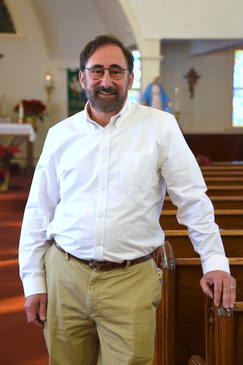
“It just made them feel good, and it made me feel good. Their love was palpable,” he says. “A couple of them would give me literature to read, trying to nudge me in the direction of conversion. I was flattered, and I felt loved.”
Still, he says, he had no intention of joining the Catholic faith until the pilgrimage.
Of the 45 people in their group, Ira says he was the only one who wasn’t Catholic. When they arrived in Medjugorje, it was recommended that they begin their time there by going to confession. He was looking forward to the opportunity, only to learn that the sacrament wasn’t available to him.
“I was really upset. I said, ‘This isn’t fair. I’m here. I want to experience everything. I want to fully participate,’” he says.
Disappointed, he joined the group for a eucharistic holy hour and turned to Jesus for guidance. He describes it as powerful.
“I was filled with the Spirit. I was sitting there, asking Jesus to help me,” he says.
The organizer of the pilgrimage recommended that Ira reach out to Father Leon Pereira, O.P., a Dominican friar who is chaplain to the English-speaking pilgrims in Medjugorje. After Mass the next morning, Ira waited in line to see the priest. He says Father Leon was apologetic but, noting his schedule and a bad cold, didn’t think a meeting would be possible during the few days Ira was going to be in Medjugorje.
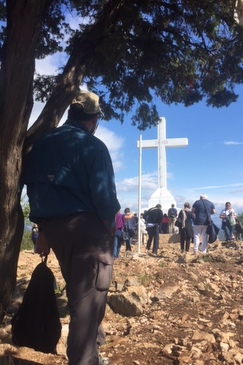
But the next morning, during a Mass attended by hundreds, Ira received an unexpected invitation.
“There are about 600 people in the church. And at the end of Mass, Father Leon said, ‘Before you leave, I need a gentleman by the name of Ira to meet me at the sacristy,’” recalls Ira. “There was an intervention there, I know, from above, that put us together.”
They talked for an hour, and Father Leon encouraged him to consider RCIA. The two remain in touch.
While Ira describes the invitation from Father Leon as the peak of the pilgrimage, he says it was the overall experience, including the love and support of his fellow pilgrims, that led him to the Catholic Church.
“It was a very powerful place,” he says. “We were just immersed, total immersion.”
He says he still feels a strong connection to the Blessed Mother and now prays the rosary nightly.
He views becoming Catholic not as turning away from his Jewish faith but as building upon it.
“As Father Leon pointed out, the trunk of the faith is Judaism, on which is grafted Christianity. It’s all connected, so it’s sort of a growth into a deeper level,” he says.
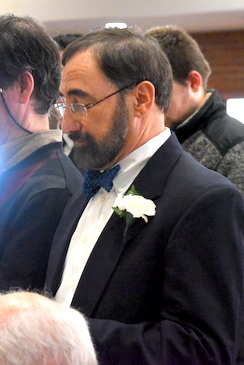
“He is so knowledgeable, and he understands Judaism,” Ira says.
As he has drawn closer to Christ through prayer, Ira says he has seen the blessings in other areas of his life, especially in his work to help those battling opioid addiction. Ira is a doctor who most recently specialized in hospice care and in treating patients battling addiction. An overwhelming caseload and a public forum on the issue in 2014 led him to form the Mid-Coast Recovery Coalition, a non-profit dedicated to reducing the rate of drug addiction in Mid-Coast Maine.
Despite his commitment and hard work, the coalition struggled to raise money and get off the ground until recent months. Ira doesn’t believe the timing is a coincidence.
“I feel like our success lately is because of God. I know it is, because we’re doing lots of praying,” he says. “I feel like I am so connected to God now, at every moment. That’s an end unto itself. If nothing else happened, I am ecstatic, but to see everything else changing so rapidly, for good, I can’t help but believe there is a direct connection. People are coming to us offering to give money, give time, people whom I never heard of are suddenly showing up and saying, ‘I’m on board.’”
The coalition has now launched “Helping Families Succeed,” a program aimed at helping families end the cycle of addiction, and it is working towards establishing transitional housing for recently released inmates and for those recovering from addiction, and towards opening a rehabilitation center.
Ira says while he used to pray for specific needs, his prayers now are just for goodness. He says his relationship with God has blossomed.
“I just feel God’s love so intensely, amazingly. There is no word for it,” he says. “I’m overwhelmed.”
Once he receives the initiation sacraments, he says what he is looking forward to the most is going to confession.
“I just want to make myself a better person,” he says. “I just want to be better.”
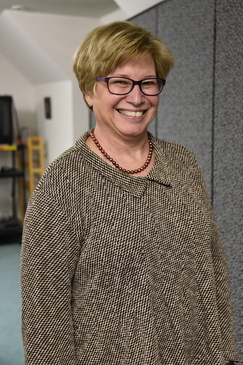
“It was being practical and not frightening. It didn’t seem like a lot of mystic stuff that I was thinking the Catholic Church was about,” she says. “That was the beginning. I just started reading other books that he had by Matthew Kelly, and then, eventually, we ran out of those, and I said,
‘Do you have anything else?’”
She read works by Scott Hahn, which she describes as troubling because of Hahn’s own conversion story. Once a Presbyterian minister who spoke out against the Catholic Church, he is now a well-known Catholic theologian and author.
“It just hit a nerve with me,” she says. “I would say, ‘I’m not going to read this anymore.’ And then, I would pick it up and read it again.”
Connie began downloading more books to her Kindle. The more she read, the more questions she had.
“I prayed and said, ‘God, I don’t know what I’m supposed to do. Please tell me. Give me answer. I just need to know.’”
She says she normally doesn’t begin a new book immediately after finishing one, but this time she did. In it, she read about the Reformation and the seven books Martin Luther removed from the Bible. For her, it was an eye and door opener.
“I thought the Catholic Church added books to the Bible,” she says. “It was like a bolt of lightning. It was shocking to me. I made my decision then.”
Connie says her reading also helped her appreciate that there is one, universal Catholic Church, with a belief system not influenced by local norms.
She describes the RCIA class as “the best one hour and twenty minutes of my whole week.”
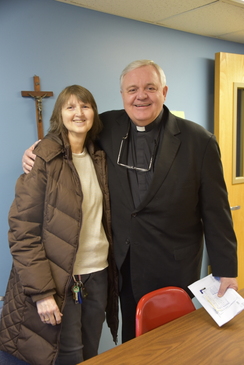
“When you go in, you know everybody, and it’s just wonderful,” she says.
For Judy, the decision to join the Church was driven not by words but by witness, tinged with tragedy. Last year, her husband, Jim, was diagnosed with a terminal illness. Judy says Jim was always a man of religious belief, but he had drifted away from the Catholic Church, the faith of his younger years. When he became ill, he sought that connection again.
The couple had their marriage blessed in the church, and Judy says it was her husband’s desire that she join the faith. He had envisioned that they would participate in the RCIA program together, but his illness made that impossible.
Judy, however, saw the impact returning to the Catholic faith had on her husband before he died. She remembers, for instance, when he received the sacrament of the anointing of the sick.
“You could see the peace come right over him,” she says. “It was just so healing for him.”
Judy, who has battled illness herself, says she wanted to experience what her husband found.
“Even though he has already passed away, I still want to become Catholic. I want to have that peace that he had. That is what I’m searching for,” she says.
Still seeking her husband’s presence, she says she especially finds comfort in knowing that the communion of saints is gathered with the congregation during Mass.
“At Mass, we are with those who are in heaven. They’re there every Mass, worshipping with us,” says Judy. “Where Christ is, that is where they are.”
Judy is looking forward to being baptized, hoping it will bring her greater peace.
“I am happy to be here,” she says. “I think I’m lucky to have found it. I just wish that I had done this before.”
While the parish will have much to celebrate this Easter Vigil, as it welcomes Judy, Connie, Ira, and 10 other new members, hopes are high that the numbers will be even greater in future years. Father Bob has introduced faith-sharing cell groups that will meet throughout the year. One hundred-forty parishioners signed up to participate.
“We have not effectively invited people to a personal relationship with Jesus Christ and to a knowledge of him and a knowledge of his Church,” he says. “What those in RCIA are receiving and have received, we need to begin to give to the people in the pews because they will become our effective evangelizers. They, then, will go out in the world.”










